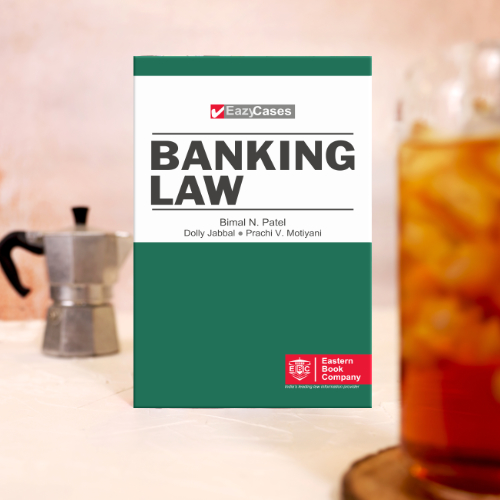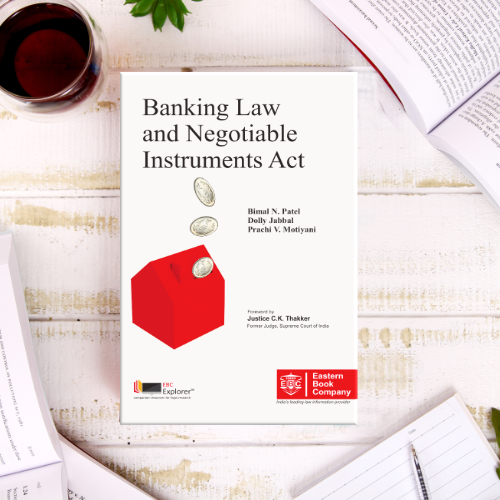
In the rapidly evolving financial sector, staying updated on banking regulations is non-negotiable for legal practitioners. Whether you’re advising clients, working in compliance, or handling litigation, the right resources can sharpen your expertise. This curated list covers foundational texts and advanced commentary to help you navigate the complex world of banking law with confidence.
1Eazy Cases: Banking Law

This book comprehensively covers key topics including Public and Private Sector Banks, Technology and Banking, and the Relationship between Banker and Customer. It also discusses Special Classes of Customers, Nature and Types of Accounts, and major banking legislations. Detailed sections of the Negotiable Instruments Act, 1881 (Sections 1–147) are included. The book further examines the Banking Regulation Act, 1949, RDDBFI Act, 1993, and SARFAESI Act, 2002. It is structured with clear chapters for easy reference and practical understanding. Click here to know more
2Banking Law and Negotiable Instruments Act

The Banking Law and Negotiable Instruments Act offers a clear, thorough study of precedents, covering topics from the history of Indian banking to e-banking trends. It explains the Banking Regulation Act, 1949 and the Negotiable Instruments Act, 1881, including the 2015 Amendment Ordinance. Section-wise analysis and judicial precedents are presented in a lucid style. The book aligns with law school syllabi and banking exams like Judicial Services and IBPS. Free learning resources on EBC Explorer™ include case law access, statute updates, forums, and self-assessment tools. Click here to know more
3Banking Law for Managers

Banking Law for Managers is tailored to help professionals in companies and institutions align their roles with banking laws. It covers key topics like banker-customer relations, SARFAESI Act, 2002, Technology and Banking, and the Negotiable Instruments Act, 1881. The book also explains Central Banking Institutions and the formation and functioning of banking companies. It equips current and future business managers to understand and apply banking law principles. This enables them to effectively identify and resolve legal issues in business settings. Click here to know more
4Banking and Negotiable Instruments

“Banking and Negotiable Instruments” by Dr. Avtar Singh is a comprehensive text divided into three parts: Banking Law, DRT and SARFAESI, and Negotiable Instruments. This edition includes a new part on DRT and SARFAESI, a dedicated chapter on Dishonour of Cheques, and discussion on the 2018 Amendment Act. It covers key recovery mechanisms and enforcement procedures under DRT and SARFAESI in detail. Recent Supreme Court and High Court rulings are also incorporated. The book is ideal for LL.B. and LL.M. students, bankers, professionals appearing for IBPS, JAIIB, and CAIIB exams. Click here to know more
5Banking And Negotiable Instruments: Law and Practice

This book offers a clear and updated exposition of banking law, written specifically for non-law and non-commerce readers. Divided into nine parts, it covers FEMA, IBC, RBI regulations, Negotiable Instruments, KYC, Customer Service, and Operational Risk in a simple, structured format. The author draws on over 30 years of industry experience, using short sentences, numbered lists, and paraphrased court rulings for clarity. Separate chapters address the intersection of banking law with FEMA and IBC. Bonus: Includes two insightful articles by industry expert Pramod Rao. Click here to know more
6Money Laundering: Prevention, Law & Practice

“Money Laundering: Prevention, Law & Practice” by Abhijeet Sharma is a detailed and authoritative work on the legal framework addressing money laundering. It explains key concepts, the stages of money laundering, and global as well as regional efforts to combat it. The book explores emerging threats like cyber-laundering, virtual currencies, and digital payment risks. It includes a section-wise commentary on the Prevention of Money Laundering Act, 2002, along with relevant rules and case law. RBI and SEBI guidelines, as well as PMLA rules, are also thoroughly discussed, making it essential for legal professionals. Click here to know more
















